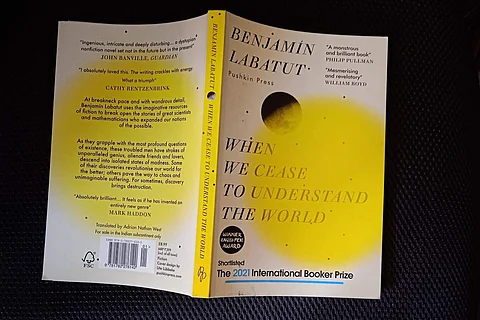

MP Prasad was only 32 years old when he was conned and lost a small fortune. The goldsmith in Palakkad died by suicide in 2006 but that’s not the reason he became posthumously famous. Prasad is reportedly the only person to have documented the taste of Potassium Cyanide, the poison that was supposed to kill one instantly, before dying. Fourteen years later, his story became part of a Chilean writer’s book that got shortlisted for the 2021 Booker Prize – When We Cease to Understand The World, by Benjamin Labatut.
The effects of cyanide are so swift that there is but one historical account of its flavour, left behind in the early twenty-first century by MP Prasad, an Indian goldsmith, thirty-two years old, who managed to write three lines after swallowing it: “Doctors, potassium cyanide. I have tasted it. It burns the tongue and tastes acrid,” said the note found next to his body in the hotel room he had rented for the purpose of taking his own life.
That’s from Benjamin Labatut’s book, a fictional account of the lives of three real-life scientists. The book begins with the cyanide story of how thousands of suicides occurred in Nazi Germany towards the end of World War II, including that of Adolf Hitler, who incidentally feared the cyanide might have been tampered with to make it painful for him and shot himself in the head.
When Benjamin’s book came out, the cyanide story and the legends about its taste once again surfaced. Many stories had come out about scientists attempting to record its taste, sacrificing their lives in the process. One famous story says that a scientist managed to write down just the letter ‘S’ for taste, so no one could make out if it meant ‘sour’ or ‘sweet’.
“All that’s fiction,” says Dr Mohammed Shafi, retired head of the Department of Chemistry at the University of Calicut. “When the Koodathayi cyanide murders came out, some gave wrong views about the victims dying as soon as their tongues touched cyanide. It doesn’t happen that way. It is not an easy death as it is made out to be but a very painful one. Oxygen intake stops and the victim suffocates for breath. At least 200 milligrams of cyanide should enter the body for death to occur.
Watch: 'The Jolly Story: Decoding the deaths that shook Kerala'”
He is, however, not familiar with the story of Prasad who wrote about the taste that no one before him knew. Newspaper reports of the time – July 2006 – say that Prasad ordered a bottle of liquor in his hotel room, mixed a pinch of cyanide in it with the tip of his pen. Police reportedly deduced that Prasad accidentally chewed the end of the pen with which he mixed the cyanide, and that’s how he tasted the poison, before adverse effects took over. The Indian Express report by Rajeev PI further quotes Prasad’s suicide note as mentioning a novel in which he read about a killer smearing the pages of a book with cyanide, which the victim consumed when he wet his fingers to turn the pages.
In the Hindustan Times report of July 2006 by Ramesh Babu, police surgeon PB Gujral is quoted as saying that the suicide note is a document, and there is no written proof about the taste of cyanide.
Prasad’s story hardly came up for discussion in the years afterward until Benjamin Labatut in Chile wrote about it again.